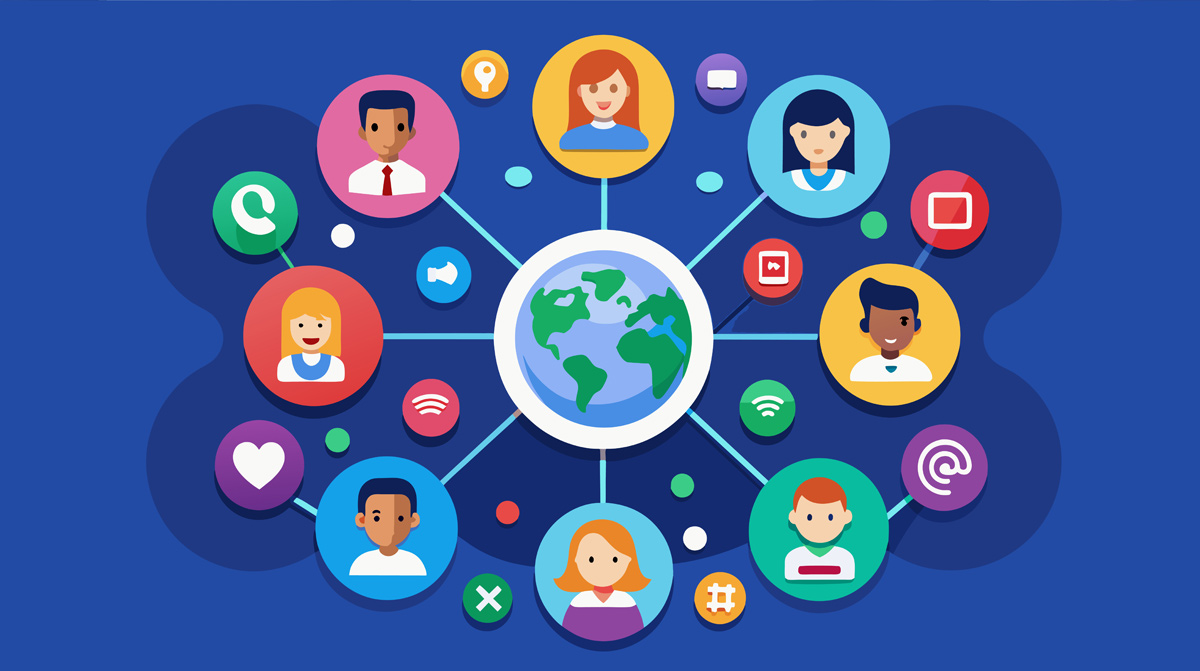Ownership of a small business is more of a marathon than a sprint. Every customer is unique, and each lead and sale is exceptional. In today’s digitally connected world, merely meeting customer expectations isn’t enough; it’s about understanding, anticipating, and consistently exceeding them to turn customers into advocates.
That’s not magic, it’s the power of a data-informed Customer Relationship Management (CRM) system. For small firms hustling to compete, a robust CRM software for small businesses is not just helpful, it’s essential. It drives every strategy, every decision, and every interaction.
Gone are the days when CRM was reserved for large enterprises with massive budgets. Today, small businesses can partner with a trusted CRM development company to implement customized, scalable solutions that streamline customer interactions and unlock growth. With the right CRM in place, entrepreneurs can make smarter decisions, improve customer relationships, and drive a thriving business community.
Embracing the Data Revolution in CRM
Managing customers has long been a problem that small businesses have depended on cobbled-together spreadsheets, crammed inboxes, and the memory of team members. This is a piecemeal strategy that silos critical customer data, creating missed customer opportunities and untapped growth potentials.
A data-driven CRM changes that all.
It is all about collection, assessment, and reaction to everything available to customers. Look at customer buying/not buying, traffic of sites, email activity/interaction, customer support conversation, and even activity across social media marketing, which is then combined into a single profile of each customer. Through this opinion, small businesses can use evidence rather than intuition about strategies for decision-making. It ensures that all outreaches, product recommendations, and service interactions are well customized. It’s the difference between estimating what a customer may desire and knowing it.
The Pillars of Growth: How Data-Driven CRM Accelerates Your Business
1. Enhanced Customer Understanding and Personalized Engagement
A data-driven CRM also shows you precisely who your customers are. A record of their preferences, pain points, and behaviors is noted and can help you customize your audience. Imagine having data about what customer groups want to receive an email notification about new products versus another group that appreciates a more personal phone call.
Additionally, envision understanding the average buying frequency for different clusters of customers. It helps achieve hyper-personalization to base a campaign and support on more sophisticated needs, and market it based on market-specific needs. Caring and educated assistance truly can improve the quality of delivery.
Reaching this grade of customer relationship management either makes a company or breaks it, aiming at customer retention and repeat business. Customer touches, CRM systems, and focused campaigns are sure to bring high returns on the investment by personally increasing customer interactions.
2. Enhanced Visibility into Sales Pipeline and Precise Forecasting in Real-Time
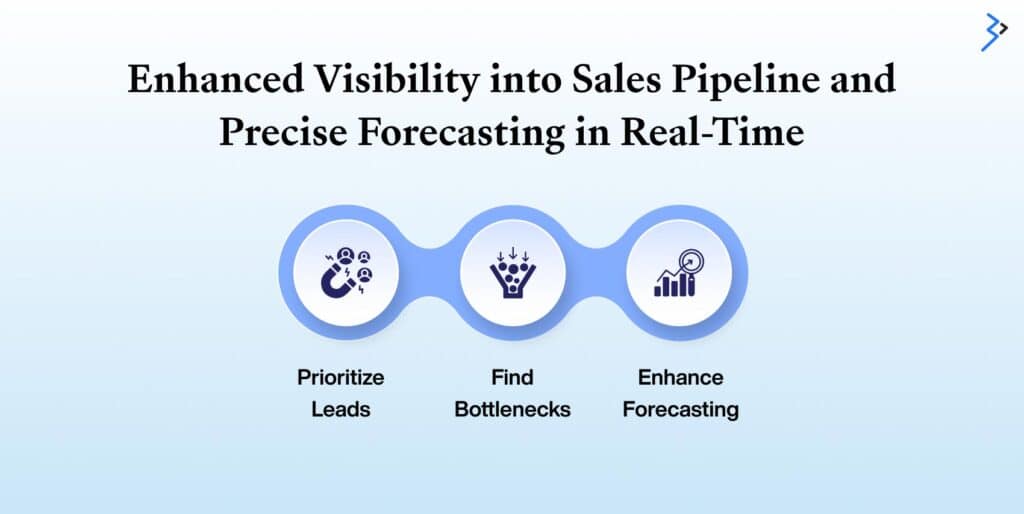
Every small business must efficiently manage its sales process to succeed. Providing a data-driven CRM sales pipeline management feature offers clarity that you’ve never seen before. You’ll know in real-time where every lead in your pipeline is – from initial contact to deal closed. The compelling part about being able to view your sales process visually, in order, is that you can:
Prioritize Leads: You’ll immediately see which leads are hot and ready for follow-up, and you can direct the team’s energy where it will yield the best return.
Find Bottlenecks: You will also be able to identify where deals are likely to be stalled in your pipeline, allowing you to streamline your sales process.

Enhance Forecasting: Armed with definite data on conversion rates at each level, you can provide a much better revenue forecast, enabling you to make more suitable plans for your resources and arrive at more strategic judgments.
This degree of perception allows your salespeople to move from reactive selling to proactive and strategic selling, with quantifiable results that reduce sales cycles and increase your donors’ closing rates. High-quality CRM tools developed in response to small businesses are devised to bring this sort of lucidity.
Read More – Top 10 Open Source ERP and CRM Systems
3. Automation of Repetitive Tasks to Maximize efficiency
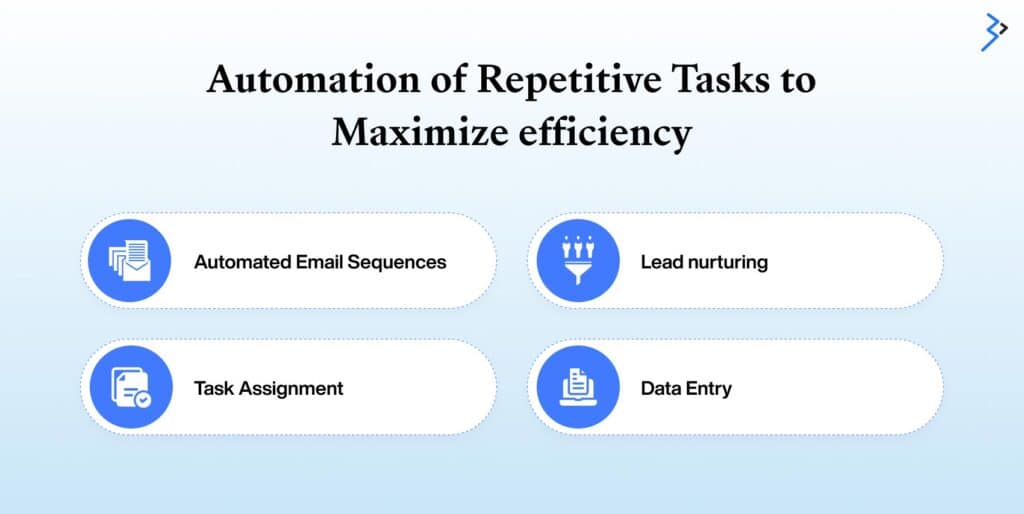
Many small businesses run lean operations, so efficiency is critical. Data-driven CRM is perfect for automating the lousy, tedious, and excessive tasks that take too much time and resources. Just imagine:
Automated Email Sequences: After the customer takes specific actions, the appropriate welcome emails, follow-up emails, or post-purchase surveys are automatically sent.
Lead nurturing: Automatically move leads from open to closed through a path of every form of engagement behaviors.
Task Assignment: Explicitly assign the follow-up task to sales or support teams. The task would automatically be assigned based on particular actions taken by the customer.
Data Entry: Any calls, emails, and customer interactions should be automatically recorded so your team has less work to perform tedious data entries.
These automation processes will allow you to reallocate your team’s energy and effort into high-value activities: building relationships, closing deals, and innovating! This degree of operational efficiency is a true hallmark of a good CRM software program for small businesses.
4. Proactive Customer Retention and Revenue Expansion
In general, it is more expensive to gain a new customer, and more profitable when you retain existing customers. A data-driven CRM serves as an early-warning system and helps you identify opportunities to retain customers.
A data-driven CRM can:
Identify At-Risk Customers: Efficiency determines which customers have gone quiet or haven’t purchased anything in a while, so your team can effectively reach out to them first.
Help Identify Upsell/Cross-sell Opportunities: With substantial purchase history and expressed interests, the CRM can find relevant ‘add-ons’ and increase customer lifetime value.
Optimize Support: When support agents are provided with the holistic view of customer history, it is easier to resolve customer issues in less time and even have a positive experience, turning potentially dangerous experiences into extraordinary ones.
This proactive approach will give you a university-level degree in customer loyalty, it will be critical in reducing churn, and if you are as good as you think, you might even create an organic revenue stream.
5. Smarter Marketing Spend with Detailed ROI Analytics
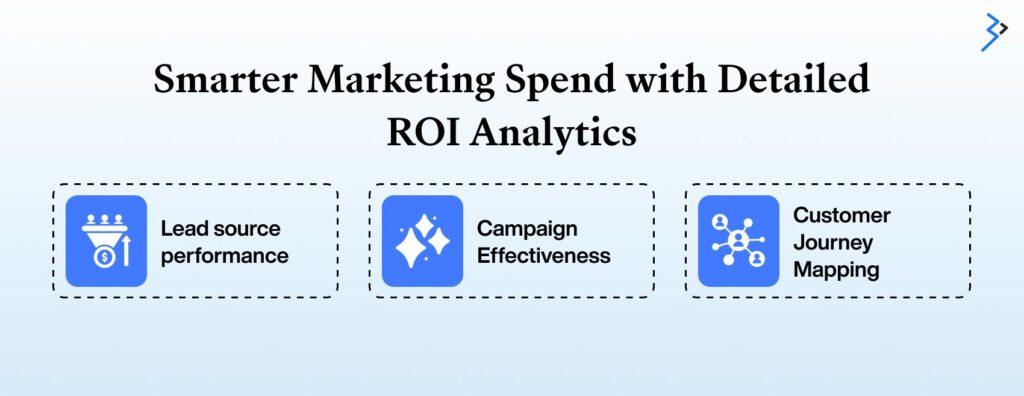
For small companies, every dollar spent on marketing is critical. A CRM based on data bridges your marketing efforts and sales results together, yielding essential insights into what works. You can monitor:
Lead source performance: What sources (social media, organic search, and paid advertising) provide good leads and conversions?
Campaign Effectiveness: ROI of specific marketing campaigns linked to customer interaction and sales.
Customer Journey Mapping: Discover the interaction points of meeting customers before purchasing your brand.
This analytical capability enables you to maximize your marketing spend, doubling down on practical strategies and cutting back on ones that are not working, resulting in much improved returns on marketing investments.
Cloud CRM Solutions: The Accessible Powerhouse for Small Businesses
Cloud CRM allows any small business firm to benefit from CRM-related capabilities that can help them. Thanks to Cloud Services CRM, SMEs do not have to make costly hardware and software purchases, implementation, or a hefty IT investment. With an internet-connected device, they can pay for a subscription and securely access it anywhere, anytime.
Because small businesses can legally use a ‘massive’ and powerful technology, they can deploy sophisticated and scaled CRM systems and scale back when needed. The software provider can manage system upgrades and updates, allowing you more time to focus on growing any aspect of your business, rather than spending your best resources on IT infrastructure or maintenance anyway. Cloud computing has more flexibility, whether it is a CRM designed for broad usage, or through specific means, such as furniture CRM.
Read More – How Social CRM Boosts Sales and Lead Conversion
A Specific Look: Data-Driven CRM in the Furniture Industry
Consider a furniture business – a perfect example of how a data-driven CRM can transform operations. In this sector, sales cycles can be long, customer relationships are key, and product catalogs are vast and often customized.
A dedicated furniture CRM solution, built on a data-driven approach, would allow a business to:
- Monitor customers’ preferred styles, materials, and colors after every visit or through online connections.
- Handle made-to-order requests, including consultation, design, manufacturing, and shipment; all details will be recorded.
- Target customers with promotions (e.g., “I have sofa customers who might be interested in coffee tables”).
- Follow-ups should be automated when there is a design consultation or confirmation of delivery.
- Manage a complex CRM sales pipeline management process from showroom visit to final installation, ensuring no lead falls through the cracks.
- Provide sales associates instant access to customer history, past purchases, and expressed interests, allowing for highly personalized service, whether customers want bedroom sets or furniture.
In such niche markets, generic CRM software used by small businesses may have to be customized. At this point, the experience of a CRM development firm comes in handy when designing or adapting furniture CRM systems appropriately.
Implementing Your Data-Driven CRM: Key Considerations
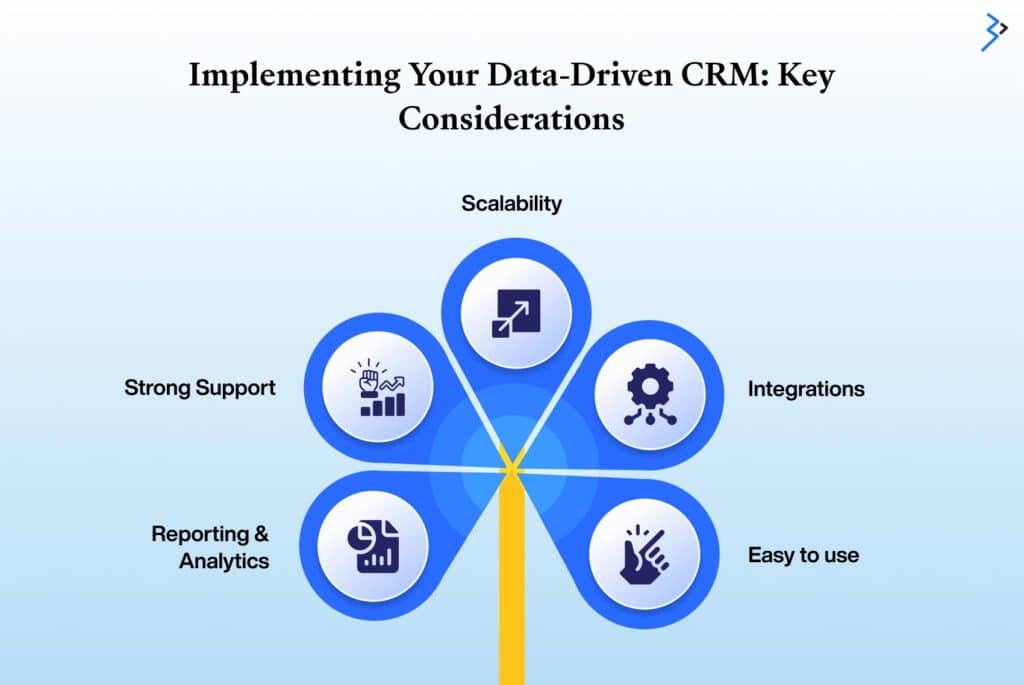
Choosing and applying a data-driven CRM solution is a strategic move in any small company. It is an episode on selecting the right custom software development services in a small business, how you intend to define your customer journey, sales, and marketing procedures, and how your team will adopt it. Solutions that you will be interested in watching out for are those that include:
Scalability: Is it scalable with your business?
Integrations: Is it linked with other platforms you already have (email marketing, accounting software)?
Easy to use: Is it something the user team wants to use?
Reporting & Analytics: Does it provide the insights you want?
Strong Support: Is help easy to get if you need it?
Read More – Boosting Sales Performance With Mobile CRM Apps
When you decide to invest in a data-driven CRM system, you are investing in the future success of your small business; better customer relationships, more efficient selling methods, and better, more informed decisions to achieve sustainable long-term growth. Brainvire knows that every decision can be consequential for small businesses, and partnering with the right technology partner is essential.
Brainvire is a top CRM development company with experience developing and implementing CRM systems for small companies that use cloud CRM solutions to ensure they are fully functional and scalable. Since we work with CRM sales pipeline management and have developed several unique solutions, from salon CRM to large furniture CRM systems, we can implement the data-based CRM strategy that best meets your unique growth goals. The time has come to utilize your customer data to be your best asset and ensure your business survives and thrives in the competitive business arena.
FAQs
A data-driven CRM software for small businesses collects and analyzes all customer interactions (purchases, website visits, emails) to create a single, unified customer profile. This helps companies to make informed decisions and personalize customer engagement for growth.
It provides real-time CRM sales pipeline management, offering clear visibility into leads and deals. This helps small businesses prioritize opportunities, identify bottlenecks, and make more accurate revenue forecasts, leading to improved close rates.
Absolutely. A furniture CRM system, built on a data-driven approach, allows businesses to track specific customer preferences (styles, materials), manage custom orders, and automate tailored follow-ups, essential for specialized retail segments.
Cloud CRM solutions eliminate the need for expensive hardware and IT maintenance, making powerful CRM capabilities accessible and scalable for small businesses. They allow secure access from anywhere, on any device.
A CRM development company like Brainvire is crucial for tailoring CRM systems for small business to unique needs, ensuring seamless integration with existing tools, and customizing specific solutions (e.g., furniture CRM systems) for optimal growth and efficiency.
Related Articles
-
Boosting Sales Performance With Mobile CRM Apps
In today’s fast-paced business landscape, customer relationship management (CRM) is crucial in driving sales performance and fostering lasting customer relationships. With the advent of mobile technology, the evolution of CRM
-
How An Integrated ERP System Seamlessly Unifies Different Systems Within Your Business
A successful business decision relies on data collected from different aspects of business within the company and data obtained from customers, suppliers, and business partners externally. However, consolidating and managing
-
Customer 360 View: An Advanced Plugin that Transforms Your Customer Engagement Like Never Before
Unmatched customer experience is the result of a well-planned customer engagement strategy. Needless to say, the customer 360-degree view has become an indispensable feature when planning such strategies. But here’s




